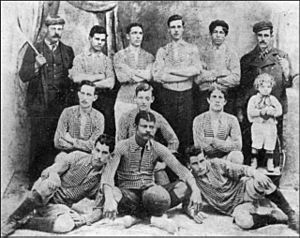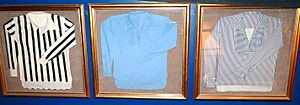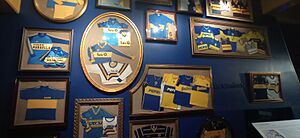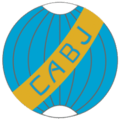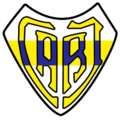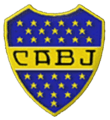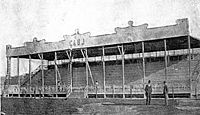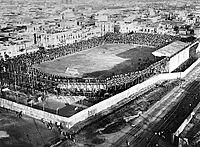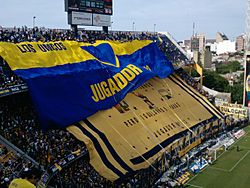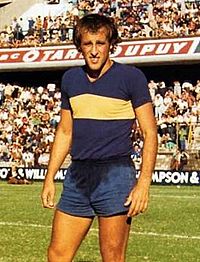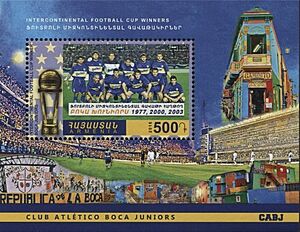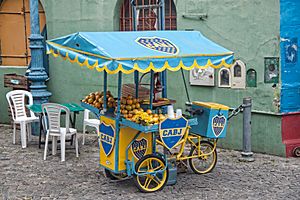Boca Juniors facts for kids
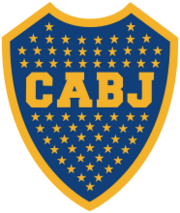 |
||||
| Full name | Club Atlético Boca Juniors | |||
|---|---|---|---|---|
| Nickname(s) | Xeneize (Genoese) Azul y Oro (Blue and Gold) El Más Grande de Argentina (The Biggest of Argentina) La mitad más uno (The Half more One) |
|||
| Short name | Boca | |||
| Founded | 3 April 1905 | |||
| Ground | Estadio Alberto J. Armando | |||
| Capacity | 57,200 | |||
| Chairman | Juan Román Riquelme | |||
| Manager | Miguel Ángel Russo | |||
| League | Primera División | |||
| 2024 | 6th | |||
|
||||
Club Atlético Boca Juniors is a famous sports club from La Boca, a neighborhood in Buenos Aires, Argentina. It is best known for its men's professional football (soccer) team. Since 1913, the team has always played in the top Argentine league, the Argentine Primera División.
Boca Juniors has won more official titles than any other Argentine club, with 74 national titles. These include 35 Primera División championships and 17 national cups. The club also received a special award from the Argentine Football Association for their successful trip to Europe in 1925.
Internationally, Boca Juniors has won 22 major titles. This makes them one of the top clubs in the world for international titles. Their success often places them among the top 25 clubs in the IFFHS's Club World Ranking. They were even named the best South American club of the first decade of the 21st century (2001–2010).
Boca Juniors has a huge rivalry with River Plate. Their matches are called the Superclásico, one of the most exciting rivalries in football worldwide. Boca's home stadium is the Estadio Alberto J. Armando, also known as La Bombonera. The club's youth academy has helped many Argentine players become international stars.
Besides men's football, Boca Juniors also has professional women's football and basketball teams. They also offer many other sports like bocce, boxing, chess, field hockey, futsal, gymnastics, handball, martial arts, swimming, volleyball, weightlifting, and wrestling. As of early 2023, Boca Juniors had the most members of any club in Argentina, with over 315,000 fans.
Contents
Club History
How Boca Juniors Started
On April 3, 1905, a group of young Italian boys from Genoa met to create a football club. The meeting happened at Esteban Baglietto's house. The other founders were Alfredo Scarpatti, Santiago Sana, and brothers Juan and Teodoro Farenga.
Other important founding members included Arturo Penney, Marcelino Vergara, and Donato Abbatángelo.
Early Success and Growth
In 1913, Boca Juniors was promoted to the Primera División, Argentina's top football league. This happened when the Argentine Football Association decided to increase the number of teams in the league.
In 1925, Boca Juniors made its first trip to Europe. They played 19 games in Spain, Germany, and France, winning 15 of them. Because of this successful tour, the Argentine Football Association declared Boca "Campeón de Honor" (Champion of Honor).
Over the years, Boca Juniors became one of the most popular teams in Argentina. They gained a huge number of fans not only in their home country but also around the world.
Team Kit and Badge
Kit Colors and Design
According to the club's official website, Boca Juniors' first jersey was white with thin black stripes. Later, they wore a light blue shirt, then another striped jersey, before finally choosing their famous blue and gold colors.
There is a story that Boca Juniors' first jersey was pink, but many historians believe this is not true. They say there is no strong proof for it.
A popular legend explains how Boca got its blue and gold colors. In 1906, Boca played a match against Nottingham de Almagro. Both teams had similar shirts, so they played to decide who would keep the design. Boca lost.
After the loss, the team decided to use the colors of the flag of the first boat to sail into the port of La Boca. This boat turned out to be a Swedish ship, which has yellow and blue colors. So, Boca Juniors adopted yellow and blue as their new team colors. The first design had a yellow diagonal stripe, which was later changed to a horizontal stripe.
Special and Controversial Kits
Over the years, Boca Juniors has worn some unique alternate jerseys. For example, in a 1963 Copa Libertadores match against Universidad de Chile, whose uniform was also blue, Boca wore a shirt similar to AC Milan's.
When Nike became the official kit supplier in 1996, they added two thin white stripes around the gold band, which caused some debate among fans. Nike also made a silver jersey just for the 1998 Copa Mercosur.
For the club's 100th anniversary, Nike released special versions of old jerseys. This included a 1907 shirt with the diagonal sash, which the team wore in two matches in 2005. Other special kits included a black and white striped jersey and a purple one.
However, no shirt caused more controversy than the pink away jersey released for the 2013–14 season. Fans widely disliked it. Because of this, its first use was delayed until the very last game of the season. Nike then designed a bright yellow shirt as a replacement.
In 2016, the club wore a black jersey for the first time as a third kit. Even though the club president had said it would never be worn, it debuted just four days after the announcement.
Adidas became the club's current kit supplier in January 2020. This agreement will last until 2029.
Kit Suppliers and Sponsors
| Period | Kit Manufacturer | Shirt Sponsors |
|---|---|---|
| 1980–83 | Adidas | – |
| 1983 | Vinos Maravilla | |
| 1984 | Dekalb | |
| 1985–89 | Fate | |
| 1989–92 | Fiat | |
| 1992-93 | Parmalat | |
| 1993–95 | Olan | |
| 1996 | Quilmes | |
| 1996 | Topper | |
| 1996–01 | Nike | |
| 2001–03 | Pepsi | |
| 2003–04 | Pepsi & Goodyear | |
| 2004–05 | Red Megatone & Goodyear | |
| 2006 | Megatone & Goodyear | |
| 2007–09 | Megatone & UNICEF | |
| 2009–11 | LG & Total | |
| 2012–14 | BBVA & Total | |
| 2014–16 | BBVA & Citroën | |
| 2016–18 | BBVA & Huawei | |
| 2018–19 | Qatar Airways & Axion Energy | |
| 2020–21 | Adidas | |
| 2021–22 | Qatar Airways | |
| 2022–23 | None | |
| 2023– | Betsson & DirecTV |
Club Badge Evolution
The club's badge has changed five times over its history, but its basic shape has stayed mostly the same.
The first known badge appeared in 1911 on the club's official papers. In 1932, the club announced that a star would be added to the badge for each Primera División title won. These stars first appeared on a club report in 1943.
A version with laurel leaves was shown in a magazine in 1955 to celebrate the club's 50th anniversary, but it was never officially used by the club.
The badge with stars has been a regular feature on Boca Juniors uniforms since 1993.
In 1996, a new badge was introduced as part of a new visual identity for the club. This new design removed the horizontal band and featured new fonts and styles.
Home Stadium
Early Grounds
Boca Juniors played in several places before settling at their current location on Brandsen Street. Their first ground was in Dársena Sur of the old Buenos Aires port. They left it in 1907 because it didn't meet league rules.
From 1908 to 1912, Boca Juniors used three different grounds in the Isla Demarchi area. In 1913, their first year in the top league, the club didn't have its own stadium. They played home games at other teams' fields.
Between 1914 and 1915, the club moved away from La Boca to Wilde. However, a poor season and low attendance in 1915 made them move back to La Boca.
Building La Bombonera
On May 25, 1916, Boca Juniors opened a new stadium at Ministro Brin and Senguel streets. They played there until 1924. Then, they moved to Brandsen and Del Crucero streets to build a new stadium. This stadium lasted until 1938.
In 1938, the club decided to build a completely new stadium with concrete stands. This is the current stadium. While it was being built, Boca played its home matches at Ferro Carril Oeste's stadium.
The current stadium was finished on May 25, 1940. A third level was added in 1953, which gave it the nickname La Bombonera (meaning 'The Chocolate Box'). One side of the stadium was built vertically, with many seating areas stacked on top of each other. This unique design allows it to fit into the club's property.
La Bombonera is famous for vibrating when Boca fans jump in rhythm. People say, "La Bombonera does not tremble. It beats."
The stadium can hold about 54,000 people. Tickets are hard to get, especially for the Superclásico game against River Plate. There are plans to improve the stadium, including making it easier for crowds to move around and adding new technology.
Stadium Locations Over Time
| Field / Venue | District | Period |
|---|---|---|
| Dársena Sud | La Boca | 1905–07 |
| Isla Demarchi | Puerto Madero | 1908–12 |
| Wilde | Wilde | 1914–15 |
| Ministro Brin y Senguel | La Boca | 1916–24 |
| Brandsen y Del Crucero | 1924–38 | |
| La Bombonera | 1940–present |
Boca Juniors Supporters
Fanbase and Popularity
Boca Juniors is known as the club for Argentina's working class. This is different from their rival, River Plate, who moved to a wealthier area of the city.
Boca Juniors claims to be the club of "half plus one" (la mitad más uno) of Argentina's population. A survey in 2006 showed they had 40% of the fans, which is still the largest share. They have the highest number of fans by percentage in their country.
In 1975, a film called La Raulito was made about Mary Esher Duffau, a famous Boca Juniors fan. She passed away in 2008, and players and fans held a moment of silence for her.
Club Membership
Boca Juniors usually plays their league games in front of full stadiums. Because the club is so popular, tickets are hard to get, especially for the Superclásico game against River Plate.
As of early 2023, Boca Juniors had over 314,000 members. This makes them the club with the second-most members worldwide, after Bayern Munich. They are first in Argentina and also first in South America.
Team Nicknames
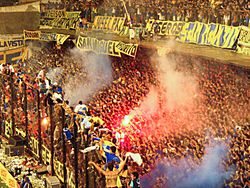
Boca fans are often called Los Xeneizes (the Genoese). This nickname comes from the Italian immigrants from Genoa who founded the team and lived in La Boca in the early 1900s.
Some rival fans in Argentina call Boca Juniors' fans Los Bosteros (the manure handlers). This name came from the horse manure used at a brick factory where La Bombonera now stands. Even though it started as an insult, Boca fans are now proud of this nickname.
Because of the team's colors, Boca's shirt is also known as la azul y oro (the blue and gold).
La Doce: The 12th Player
There is a special group of supporters called la número 12 or la doce. This name means "the 12th player" and shows how important the fans are to the team.
The group's origin dates back to 1925. A Boca Juniors fan named "Toto" Caffarena traveled with the team during their tour in Europe. He helped the team a lot and became very close to the players. They started calling him "Player No. 12."
When they returned to Argentina, Caffarena was as famous as the players. Today, "La 12" is the main name for Boca Juniors' passionate group of supporters.
International Fanbase
Boca Juniors has fan clubs, called Peñas, in many Argentine cities and in other countries like Russia, Ukraine, Spain, Israel, and Japan.
Boca Juniors is especially popular in Japan. This is because of the club's success in the early 2000s when they won the Intercontinental Cup there.
Around the world, fans are drawn to Boca Juniors because of their international titles. Many famous Boca players also went on to play for top European clubs, like Diego Maradona and Carlos Tevez.
Boca has fans throughout Latin America and in parts of the United States where many people from Latin America live.
Major Rivalries
Boca Juniors has a long and intense rivalry with River Plate. This rivalry is known as the Superclásico. It is famous worldwide as one of the fiercest and most important rivalries in football.
The Superclásico is known for the incredible passion of the fans. They jump together and sing songs against their rivals. Sometimes, there have been problems between the most extreme fans or with the police.
Out of 338 past matches, Boca has won 126, River has won 107, and there have been 105 draws. In official games, Boca Juniors and River Plate have played 259 times. Boca has won 91, River has won 85, and there have been 83 draws.
Even with such a strong rivalry, some players have played for both clubs. Famous examples include Diego Maradona and Claudio Caniggia.
The English newspaper The Observer ranked the Superclásico, especially when played at La Bombonera, as one of the "50 sporting things you must do before you die."
Players
Current Squad
|
|
Players on Loan
|
|
Player Records
Most Goals Scored
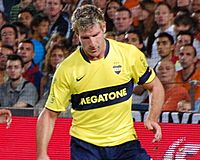
| No. | Player | Pos. | Tenure | Goals |
|---|---|---|---|---|
| 1 | FW | 1997–01, 2004–11 | 236 | |
| 2 | FW | 1926–38 | 223 | |
| 3 | FW | 1931–39 | 194 | |
| 4 | FW | 1922–32 | 192 | |
| 5 | FW | 1940–48 | 129 | |
| 6 | FW | 1941–49, 1955 | 123 | |
| 7 | FW | 1932–38 | 114 | |
| 8 | FW | 1941–48 | 97 | |
| 9 | FW | 1911–13, 1915–24 | 96 | |
| 10 | FW | 2001–04, 2015–16, 2018–21 | 94 |
Most Appearances
| No | Player | Position | Tenure | App. |
|---|---|---|---|---|
| 1 | DF | 1971–84 | 426 | |
| 2 | GK | 1976–88 | 417 | |
| 3 | DF | 1960–72 | 408 | |
| 4 | FW | 1997–2001, 2004–11 | 404 | |
| 5 | GK | 1988–96 | 400 | |
| 6 | MF | 1996–2002, 2007–14 | 388 | |
| 7 | MF | 1956–70 | 382 | |
| 8 | MF | 1934–47 | 379 | |
| 9 | MF | 1967–72, 1976–80 | 377 | |
| 10 | MF | 1942–56 | 365 |
FIFA World Cup Participants
Here are some players who were called up for a FIFA World Cup while playing for Boca Juniors:
 Roberto Cherro (1930)
Roberto Cherro (1930) Mario Evaristo (1930)
Mario Evaristo (1930) Ramón Muttis (1930)
Ramón Muttis (1930) Arico Suárez (1930)
Arico Suárez (1930) Juan Francisco Lombardo (1958)
Juan Francisco Lombardo (1958) Julio Musimessi (1958)
Julio Musimessi (1958) Federico Edwards (1958)
Federico Edwards (1958) Eliseo Mouriño (1958)
Eliseo Mouriño (1958) Alberto Mario González (1962, 1966)
Alberto Mario González (1962, 1966) Silvio Marzolini (1962, 1966)
Silvio Marzolini (1962, 1966) Antonio Rattín (1962, 1966)
Antonio Rattín (1962, 1966) Antonio Roma (1962, 1966)
Antonio Roma (1962, 1966) Alfredo Rojas (1966)
Alfredo Rojas (1966) Carmelo Simeone (1966)
Carmelo Simeone (1966) Diego Maradona (1982)
Diego Maradona (1982) Julio Olarticoechea (1986)
Julio Olarticoechea (1986) Carlos Tapia (1986)
Carlos Tapia (1986) Juan Simon (1990)
Juan Simon (1990) Alejandro Mancuso (1994)
Alejandro Mancuso (1994) Jorge Bermúdez (1998)
Jorge Bermúdez (1998) Óscar Córdoba (1998)
Óscar Córdoba (1998) Mauricio Serna (1998)
Mauricio Serna (1998) Roberto Abbondanzieri (2006)
Roberto Abbondanzieri (2006) Rodrigo Palacio (2006)
Rodrigo Palacio (2006) Juan Roman Riquelme (2006)
Juan Roman Riquelme (2006) Gary Medel (2010)
Gary Medel (2010) Claudio Morel Rodríguez (2010)
Claudio Morel Rodríguez (2010) Martín Palermo (2010)
Martín Palermo (2010) Fernando Gago (2014)
Fernando Gago (2014) Agustín Orión (2014)
Agustín Orión (2014) Wílmar Barrios (2018)
Wílmar Barrios (2018) Nahitan Nandez (2018)
Nahitan Nandez (2018) Cristian Pavón (2018)
Cristian Pavón (2018)
Coaches
Famous Coaches
The first recorded coach for Boca Juniors was Mario Fortunato. He had been a player before becoming the team's coach. Fortunato led Boca to win five titles, including four league championships and one national cup. He coached Boca Juniors in three different periods: 1930–1936, 1946, and 1956.
Carlos Bianchi is the most successful coach in Boca Juniors' history. He won nine titles, including league championships in 1998, 2000, and 2003. He also led the team to win the Copa Libertadores three times (2000, 2001, 2003) and the Intercontinental Cup twice (2000, 2003).
Juan Carlos Lorenzo, known as El Toto, won five titles with the team. These included the Copa Libertadores in 1977 and 1978, the Intercontinental Cup in 1977, and two Argentine league titles in 1976.
Alfio Basile also won five titles, just like Mario Fortunato and Toto Lorenzo. With Basile, Boca won two domestic league titles and three international cups, all within two years.
Current Coaching Staff
| Position | Staff |
|---|---|
| Head coach | |
| Assistant coach | |
| Assistant coach | |
| Fitness coach | |
| Fitness coach | |
| Goalkeeping coach | |
| Team doctor | |
| Kinesiologist |
Last updated: 2 June 2025
Source: Cuerpo técnico
Club Leadership
Executive Board
Juan Román Riquelme became the President of Boca Juniors in December 2023. He won the election with over 65% of the votes, and a record 46,400 members came to the club to vote. Jorge Amor Ameal, who was president from 2019–2023, was elected as the club's vice-president.
Club Achievements
Major Titles
- Keys
- Record
- (s) Shared record
| Type | Competition | Titles | Winning years |
|---|---|---|---|
| National (League) |
Primera División | 35 | 1919, 1920, 1923, 1924, 1926, 1930, 1931 LAF, 1934 LAF, 1935, 1940, 1943, 1944, 1954, 1962, 1964, 1965, 1969 Nacional, 1970 Nacional, 1976 Metropolitano, 1976 Nacional, 1981 Metropolitano, 1992 Apertura, 1998 Apertura, 1999 Clausura, 2000 Apertura, 2003 Apertura, 2005 Apertura, 2006 Clausura, 2008 Apertura, 2011 Apertura, 2015, 2016–17, 2017–18, 2019–20, 2022 |
| National (Cups) |
Copa Argentina | 4 |
1969, 2012, 2015, 2019–20
|
| Supercopa Argentina | 2 |
2018, 2022
|
|
| Copa de la Liga | 2 |
2020, 2022
|
|
| Copa Jockey Club | 2 |
1919, 1925
|
|
| Copa Ibarguren | 5(s) |
1919, 1923, 1924, 1940, 1944
|
|
| Copa Estímulo | 1(s) |
1926
|
|
| Copa Británica | 1(s) |
1946
|
|
| International | Copa Libertadores | 6 |
1977, 1978, 2000, 2001, 2003, 2007
|
| Copa Sudamericana | 2(s) |
2004, 2005
|
|
| Recopa Sudamericana | 4 |
1990, 2005, 2006, 2008
|
|
| Supercopa Libertadores | 1 |
1989
|
|
| Copa de Oro | 1(s) |
1993
|
|
| Copa Master | 1(s) |
1992
|
|
| Tie Cup | 1 |
1919
|
|
| Copa de Honor Cousenier | 1 |
1920
|
|
| Copa Escobar-Gerona | 2 |
1945, 1946
|
|
| Worldwide | Intercontinental Cup | 3(s) |
1977, 2000, 2003
|
Other Titles
- Independent leagues
- Liga Central de Football: 1906
- Copa Barone: 1908
Interesting Facts and Records
Boca Juniors has won 35 Primera División championships and 17 national cups. They also received an honorary title for their successful tour of Europe in 1925.
Internationally, Boca Juniors has won 22 major titles. This includes 18 titles organized by CONMEBOL. They are ranked third in the world for the number of international titles.
Boca Juniors has been ranked among the top 25 clubs in the IFFHS's Club World Ranking many times. They reached the top position six times. FIFA also named them the joint twelfth-best FIFA Club of the Century in December 2000.
Club Records
- Seasons in Primera División: 111. Boca Juniors has never been relegated since their debut in 1913.
- Largest Home Win: 11–1 against Tigre on June 7, 1942.
- Largest International Win: 7–0 against Bolívar on April 26, 2007, in the 2007 Copa Libertadores.
- Worst Home Defeat: 0–7 against San Isidro on October 10, 1915.
- Worst International Defeat: 1–6 against Palmeiras in the 1994 Copa Libertadores.
- Worst League Position: 19th in the 2013 Torneo Final.
- All-Time Top Scorer: Martín Palermo with 236 goals.
- Most Goals in a Single Tournament: Domingo Tarasconi scored 40 goals in 33 games in the 1923 Primera División.
- Top Scorer in International Tournaments: Martín Palermo with 43 goals.
- Top Scorer in Copa Libertadores: Juan Román Riquelme with 25 goals.
- Most Unbeaten Games in Domestic Tournaments: 40 matches (from 1998 to 1999).
- Most Games Played: Roberto Mouzo with 426 matches.
- Player with Most Titles: Sebastián Battaglia with 17 titles.
- Goalkeeper's Scoreless Record: Esteban Andrada went 864 minutes without letting in a goal.
- International Cups: Boca Juniors is tied for the 4th club in the world with the most international cups won (18).
Football Development
Youth Academy
The club's reserve and youth academy football teams are currently coached by former player Rolando Schiavi. He started coaching them in February 2015.
Boca Juniors has won the most Torneo de Reserva championships, with 21 titles since 1910.
Many famous Argentine players came from Boca Juniors' youth academy. These include Diego Maradona, Carlos Tevez, Leandro Paredes, and Fernando Gago.
Women's Football
The Boca Juniors women's football team plays in the Campeonato de Fútbol Femenino. They have won the championship a record 27 times. This includes winning 10 times in a row from 2003 to 2008.
While the club has not yet won any international women's competitions, they finished third in the 2010 Copa Libertadores de Fútbol Femenino. In the 2022 Copa Libertadores Femenina, they finished in second place.
Other Sports Sections
Besides men's football, Boca Juniors also has a professional basketball team.
The club also offers many amateur sports. These include bocce, boxing, chess, field hockey, futsal, gymnastics, handball, martial arts (like judo, karate, and taekwondo), swimming, volleyball, weightlifting, and wrestling.
Basketball
The Boca Juniors basketball team started in 1929. They won several Argentine championships from older leagues.
Since the Liga Nacional de Básquet (Argentina's top basketball league) began in 1985, Boca Juniors has won the league title four times. They also won the Copa Argentina five times, the Torneo Top 4 once, and one Supercopa de La Liga.
Internationally, Boca Juniors won three South American Club Championships in a row from 2004 to 2006.
Their home arena is the Estadio Luis Conde, often called La Bombonerita (meaning 'small Bombonera').
Field Hockey
In September 2022, Boca Juniors announced they would start a field hockey section for both men and women.
In May 2023, the club opened a new hockey field. Vanina Oneto, a famous player for Argentina's national women's team Las Leonas, is part of this project. Oneto was named the manager of Boca Juniors Hockey.
Futsal
Boca Juniors' men's futsal team plays in the Primera División de Futsal. This is the top futsal league in Argentina.
The club is the second most successful team in the Primera División, with 13 titles. They won one of these in 2017 by defeating Kimberley in the finals.
Boca also has a women's futsal team. They play in the Campeonato de Futsal Femenino. They won the first tournament in 2004 and won again in 2014.
Volleyball
Boca Juniors has a men's professional volleyball team. They won the Metropolitan championship in 1991, 1992, and 1996. They also finished second in the 1996–97 A1 season.
The team was temporarily stopped due to a lack of sponsors. However, it was later restarted and returned to the top league in 2005.
In August 2015, it was announced that Boca Juniors' volleyball team would not play in the Liga Argentina de Voleibol – Serie A1 from 2016. The club president made this decision, saying that being in a professional league caused a large financial loss.
However, on August 1, 2023, it was announced that Boca Juniors would once again play in the Liga Argentina de Voleibol – Serie A1 after almost eight years.
Boca also has a women's volleyball team. They play in the Liga Femenina de Voleibol Argentino and have won the tournament a record 8 times.
Merchandising and Business
Boca Juniors has expanded its activities beyond just sports. They offer many products and services to their fans.
In 2003, Boca Juniors became one of the first football clubs in the world to launch its own TV channel, Boca TV. It broadcast 24 hours a day with sports shows. The channel closed in 2005 but returned as a website in 2015.
In 2005, a company started making special coffins for fans who wanted to show their support even after they passed away.
The club also opened a special "Boca Juniors" section in the Parque Iraola Cemetery in 2006.
Also in 2006, Boca expanded its business by launching its own taxi fleet in Buenos Aires. They also created their own brand of wine, called "Vino Boca Juniors."
In 2012, Boca Juniors opened its first themed hotel in Buenos Aires. It was the first of its kind for a football club anywhere in the world. The hotel rooms are decorated in the club's colors, with photos and paintings of famous players.
There is also an Argentine steakhouse in Queens, New York City, that is a Boca Juniors themed restaurant.
Sponsorships
In car racing, the Argentine Turismo Carretera league created a category called Top Race V6. In this category, teams were sponsored by football clubs.
Famous race car drivers like Guillermo Ortelli and Ernesto Bessone, and former Boca player Vicente Pernía, drove for the "Boca Juniors" team. Ortelli even won the first Top Race V6 championship with his car painted in Boca Juniors colors.
See also
 In Spanish: Club Atlético Boca Juniors para niños
In Spanish: Club Atlético Boca Juniors para niños
- List of world champion football clubs
 | John T. Biggers |
 | Thomas Blackshear |
 | Mark Bradford |
 | Beverly Buchanan |


